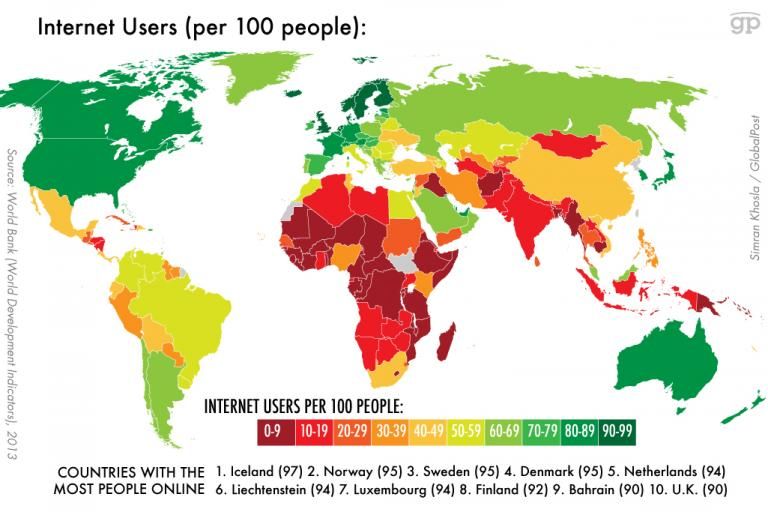The Most Common Cultural Diversity Mistakes
[3-mins]
These are the most common cultural diversity mistakes we’ll cover in this article:
- The lumberjack syndrome
- You Think We’re All the Same
- They Don’t Get It (but you do)
- I Just Don’t Understand Them
- Everyone is Online
- I Tried It and It Doesn’t Work
- If I know Some Do’s and Dont’s That’s Enough
- My Business Partner is Simply an Idiot
- You Know It, But Think It’ll be OK
- Two Hours is Enough
Even Jonah Peretti (CEO of Buzzfeed) and Mark Zuckerberg (CEO of… guess you know) get it: “Culture is Strategy“. Or to put it differently: Culture Matters. When you’re working internationally you will (underlined and bold) be facing cultural differences. Whether you like it or not.
But for some reason, most people who work internationally tend to suffer from what I call the “Lumberjack Syndrome“. If it doesn’t exist yet, I’d like to coin the phrase with this article. So what is the Lumberjack Syndrome?
The Lumberjack Syndrome
A lumberjack is a person who cuts down trees for a living. He does this the whole day using his favorite ax. One day a passerby asks him what he’s doing and why he’s sweating so much. The lumberjack looks up disturbed and answers “I’m cutting down trees, what does it look like?” The passerby answers “Why don’t you stop and sharpen your ax, you’ll be a lot faster when you would.” The lumberjack simply answers back “I don’t have time for that, I need to cut down trees.“
The Point
I hope the point is clear: sometimes you need to stop and rethink what you’re doing to get the best results. In this case, the lumberjack needs to sharpen his ax. When it comes to Culture and cultural differences it is often the last ax that will be sharpened. Often there are two reasons for this:
- People simply don’t get it (it’s really that simple, a lot of people simply don’t get it!)
- People have other priorities (like cutting down more trees)
In my business (Improving the performance of people that work internationally) most of my clients knock on my (email) door when things have gone wrong. They underestimated the impact that cultural differences had on their business. The people that don’t knock on my door often simply fail. And I’m not exaggerating.
It’s Not the Law
The title of this article is “9 Signs You’re Not Getting It (It’s Culture the Stupid!)“. The last bit “it’s Culture the Stupid” is a variation of the phrase “It’s the economy, stupid” which James Carville had coined as a campaign strategist for Bill Clinton’s successful 1992 presidential campaign against sitting president George H. W. Bush. My point here is that when you’re working internationally you will face plenty of things that are different from your home country. Things like:
- The law; local law will likely be different over there than at home
- Accounting practices; as with the law will be different in different countries
- Taxes; although the only two things in life that are certain are death and taxes, how taxes are levied will be different in different cultures
- …
All the above-mentioned “things” are relatively easy to get in terms of external services. Get a local lawyer or accountant and you should have it covered. But cultural competence is different. Cultural competence is about you. About how you deal with people from other countries. About how effective your international business will be. But are you getting it?
9 Signs You’re Not Getting It (It’s Culture Stupid)
1. You Think We’re All the Same
In a way that’s true. All humans have two ears, two eyes, and one mouth. However, genetically humans have 92% of the same genes that mice have and 98% similar to Chimps. So to that extent, we have more in common with a mouse and a Chimp than we differ. But doing business with a Chimp would be rather difficult. The things that we have in common are things we take for granted, like the business English we speak when we do business; the fact that we use the Internet for all sorts of things, etc.
What keeps causing the friction are the things where we differ. It’s like wearing a pair of shoes whereby one shoe actually hurts: You will always feel that shoe that hurts. From a cultural perspective look at it this way: We all drink, eat and sleep. However what we eat, when we eat, how we eat, and why we eat are different per culture.
Once again: The Most Common Cultural Diversity Mistakes
2. They Don’t Get It (but you do)
This is another common misunderstanding. You think you are the only one that gets it but they simply don’t. Trust me they will probably think the same thing about you. Mind you that we are all fish in our own bowl and an implication of that it is hard to describe our own culture, but a lot easier to describe the other culture. Hence, it is easier to simply blame them, rather than try to understand how you yourself might be perceived.
Once again: The Most Common Cultural Diversity Mistakes
3. I Just Don’t Understand Them
If they only did what you wanted them to do things would work out fine, right? Then the world would be a good place. The point is that whatever anyone (including yourself) does they and we do it with the best intentions. Watch the video clip below. No doubt it will bring a smile to your face. But the point of the clip is that whatever the other guy is doing he does it with the best intentions.
Once again: The Most Common Cultural Diversity Mistakes
4. Everyone is Online
Everyone is online these days, right? Even kids under the age of 13 (the age limit set by Facebook) are having a Facebook account. And after Whatsapp, Twitter, and Snapchat you don’t know what will be next. What you do know is that everyone seems to be connected and online. Indeed. It “seems” to be the case that we’re all connected and online. But in actual fact, only about 40% of the world population has access to the Internet. And having access to the Internet doesn’t mean you’re “connected” yet. Often people in less connected areas in the world will have to go through great trouble to finally get online and then only during certain hours of the day when there is electricity and when there is a good connection. Below is an overview of how connected the world was in 2015. Now, look at where the growth market is. Are you familiar with the culture in those countries? 
Once again: The Most Common Cultural Diversity Mistakes
5. I Tried It and It Doesn’t Work
The question that pops up here is: What have you tried? Have you listened with the intention to understand, rather than to reply? Did you ask why they were doing things the way they were doing them? Have you tried to see what the good aspects of their way of working are, what the advantages are of doing it their way? Once I sat down with a Belgian client and I asked her “What is the one thing that a Dutchman should do in order to be successful in doing business in Belgium?“. She stared at me intently and finally answered: “Be quiet and listen.” At first, I was shocked but in retrospect, it makes complete sense. Compared to Belgians, the Dutch are blabbermouths who keep on talking and talking. And the solution given was quite simple, right? “Listen“. Have you listened?
Once again: The Most Common Cultural Diversity Mistakes
6. If I know Some Do’s and Dont’s That’s Enough
Often when I start a workshop I ask about people’s expectations. And often Do’s and Don’ts make the list of expectations. In an article that I’ve written some time ago (read it here), I make the statement that Do’s and Don’ts are simply too simple to understand different cultures fully. We all know that the French take long lunches and that the Germans are on time and that the Indians have large families and that Americans own big cars. Do’s and Don’ts are at the same level: Superficial. The thing is that other cultures will almost always forgive you if you get a Do or a Don’t wrong. In addition, Do’s and Dont’s change when the context changes. So what is a Do in one situation becomes a Don’t in another? The point: be very careful approaching cultural differences only from a Do and Don’t perspective.
Once again: The Most Common Cultural Diversity Mistakes
7. My Business Partner is Simply an Idiot
Sometimes I play a cultural Simulation game. During this simulation, people get to play three different rounds of a certain game (I can’t give the clue away here of course). When the simulation is done we do a debrief. There are a couple of almost fixed items that tend to come out of this. One of them is “They are wrong” or “He simply didn’t get it“. One of the first things I make people aware of during a workshop or lecture is that when there are cultural differences involved (and, once again, when you work internationally there are), it starts with you. Not the other person. The other person is just the other person. If there’s anyone that can change the situation the quickest and easiest it is you. Cultural differences are all about YOU. And of course, vice versa as well. The YOU simply turns around when you start from the other person. But pointing the finger at the other is hardly ever the solution, nor is it true.
Once again: The Most Common Cultural Diversity Mistakes
8. You Know It, But Think It’ll be OK
This is probably the deadliest of them all. You know and are aware of the cultural differences but you think it will all be OK. For me, that’s more or less the same as thinking that smoking won’t kill you (but it will everyone else) and that you can get away with the dangers of it.
9. Two Hours is Enough
Well, it’s a lot better than doing nothing at all. But just like creativity, cultural competence is not something that can be rushed. It takes time. It’s a bit like learning how to walk. Most of us master the art of walking in about a year. It’s hard at the beginning, but eventually, you don’t even realize you’re doing it. The same holds true with cultural competence. It takes time and effort.
Once again: The Most Common Cultural Diversity Mistakes
The Positive Note
All doom and gloom you say? Possibly. But I’ve seen it so often: people in organizations simply brush over cultural differences or think that with a 2-hour session they’re done. While those people who do get it (and fortunately there are plenty of those as well) are enjoying their international work a lot more and as a by-product save time and money. Not a bad investment. Cultural competence is a skill that can be learned. It just takes time and effort, just like anything else that’s worth pursuing.
Want to avoid the most common mistakes when working internationally? Read this article.
Read this article about 3 things to consider when working internationally.
Any comments from your end? Please leave them here below!
Get a Taste of How Chris Presents, Watch his TEDx Talk
 Call Direct: +32476524957
Call Direct: +32476524957
 European Office (Paris) Whatsapp: +32476524957
European Office (Paris) Whatsapp: +32476524957
The Americas (USA; Atlanta, GA; también en Español): +1 678 301 8369
Book Chris Smit as a Speaker
If you're looking for an Engaging, Exciting, and Interactive speaker on the subject of Intercultural Management & Awareness you came to the right place.
Chris has spoken at hundreds of events and to thousands of people on the subject of Cultural Diversity & Cultural Competence.
This is What Others Say About Chris:
- “Very Interactive and Engaging”
- “In little time he knew how to get the audience inspired and connected to his story”
- “His ability to make large groups of participants quickly and adequately aware of the huge impact of cultural differences is excellent”
- “Chris is a dedicated and inspirational professional”
In addition, his presentations can cover specific topics cultural topics, or generally on Cultural differences.
Presentations can vary anywhere from 20 minutes to 2 hours and are given World Wide.
Book Chris now by simply sending an email. Click here to do so.
Read more about what Chris can do for you.
- Percentage of People Rating a Presentation as Excellent 86%
- Rating the Presentation as Practical 89%
- Applicability of Chris' presentation 90%
About Peter van der Lende

Peter has joined forces with Culture Matters.
Because he has years and years of international business development experience joining forces therefore only seemed logical.
Being born and raised in the Netherlands, he has lived in more than 9 countries of which most were in Latin America.
He currently lives in Atlanta, Georgia (USA) with his family.
You can find out more at https://expand360.com/
Or find out what Peter can do for you here.
- 177 Mark Steinberg - 22 February 2024
- Japanese versus Western Culture - 24 January 2024
- 176 James Kennedy on Dutch culture - 15 September 2023


 Call Direct: +32476524957
Call Direct: +32476524957 European Office (Paris) Whatsapp: +32476524957
European Office (Paris) Whatsapp: +32476524957
What an excellent list! My own 25-year experience in the field identifies all of them.
The next step is to get past the stuff people get wrong and strike the more positive notes on the benefits of adapting, adopting and co-creating (the end-game as laid out by Mr M Bennett). Go for it!
Hi Bill,
Thanks for your comment and compliment.
Yes, it is strange that so many people just don’t get it.
If you have any additions please don’t hesitate to add them here.
Thanks,
Chris
Stephen Covey made this his 7th Habit of highly effective people – to “sharpen the saw.” The ticket is we live in a constantly evolving world and we need to be willing to constantly evolve and adjust. If we get stuck in our ways we become ineffective. I would add #10 – Thinking if we have always done it this way; why change?
Thanks for adding #10.
Looking forward to seeing #11 because I’m sure there are more…
The other comment by Covey that is relevant to so called self referencing criteria ( “everybody does the same don’t they”) is:
“The way you see the problem IS the problem”.
Hi Diane,
Thanks for your comment.
I will definitely use this quote from now on. Excellent.
Thanks again.
Thank you for this article Chris. The more people will write and talk about it, the better! We need to create awareness around this topic for sure as many companies still don’t want to ‘waste’ their resources for some extra soft workshops that ‘will make no difference anyway’.
Dear Marta,
Thank you for your compliment.
I fully agree with your statement.
Kind regards,
Chris
Great article, Chris. Thanks for posting. I think I’ve heard all of them.
John Luecke
Hi John,
Thanks for the compliment.
Yes, I think a lot of people have seen some or all of these aspects.
But many many more haven’t…
Spread the word!
Kind regards,
Chris